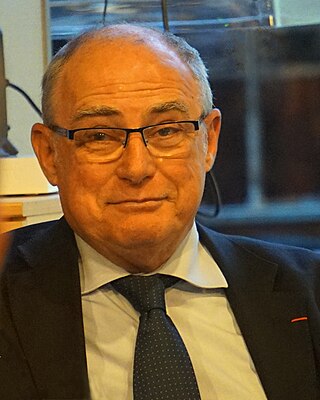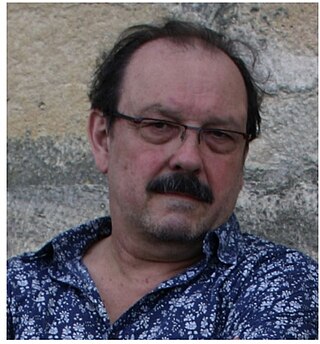Annie Laurent | |
|---|---|
 | |
| Born | June 3, 1949 |
| Nationality | French |
| Occupations |
|
Annie Laurent (born June 3, 1949 [1] ) is a French journalist and political scientist.
Annie Laurent | |
|---|---|
 | |
| Born | June 3, 1949 |
| Nationality | French |
| Occupations |
|
Annie Laurent (born June 3, 1949 [1] ) is a French journalist and political scientist.
In 1983 Laurent obtained a master's degree in international law, and 1986 she graduated with a doctorate in political science from the University of Paris II Panthéon-Assas under the supervision of Pierre-Marie Dupuy. [2]
In 1980, Laurent and Renée Conan (fr) interviewed women who were anti-nuclear activists in Plogoff, and published the book Femmes de Plogoff in 1981. [3]
Between 1988 and 1992, Laurent edited the periodical Libanoscopie in Lebanon. [4]
Pope Benedict XVI appointed her an expert to the Synode spécial des évêques pour le Moyen-Orient, which was held in Rome in October 2010. [5] In 2009 she founded the association Clarifier, [6] a Catholic proselytism organisation. [7]
Laurent's book L'Europe malade de la Turquie was the 2006 winner of the Prix Henry Malherbe. [8]

Claude Cahen was a 20th-century French Marxist orientalist and historian. He specialized in the studies of the Islamic Middle Ages, Muslim sources about the Crusades, and social history of the medieval Islamic society.

Bruno Coulais is a French composer, most widely known for his music on film soundtracks.

Hélène Carrère d'Encausse was a French political historian who specialised in Russian history. From 1999 up until her death in 2023, she served as the Perpetual Secretary of the Académie Française, to which she was first elected in 1990.

Henry Laurens is a French historian and author of several histories and studies about the Arab-Muslim world. He is Professor and Chair of History of the Contemporary Arab world at the Collège de France, Paris.
Liliane Wouters was a Belgian poet, playwright, translator, anthologist and essayist.
Visa pour l'Image is an international photojournalism festival established in 1989, which takes place annually in the entire city of Perpignan, France. This is the main and most important festival of photojournalism in France and runs from late August to mid-September for a period of 15 days.
The Prix Victor-Rossel is a literary award in Belgium that was first awarded in 1938. The award was created by three people associated with the newspaper Le Soir: the owner Marie-Thérèse Rossel, the manager Lucien Fuss and the editor-in-chief, Charles Breisdorff.
The Prix Renée Vivien is an annual French literary prize which is awarded to poets who write in French. Dedicated to the British poet Renée Vivien, the eponymous prize was first initiated in 1935, and continued intermittently by three different patrons, each with their own vision. First patron was Hélène de Zuylen de Nyevelt de Haar, followed by Natalie Clifford Barney in 1949 then more latterly and currently ongoing from 1994 with Claude Evrard. From each patron, the naming of the award after Renée Vivien was an act of remembrance. Nonetheless, women's poetry, feminist literature and the memories of romantic entanglement with the honoured poet have been inspiring on the first two patrons, who were more alike in their approach to awarding poets, while the heritage of Renée Vivien's style in contemporary poetry interested more Claude Evrard.

Joseph Yacoub is a historian and political scientist of Assyrian origin. His family moved from Salmas-Urmia, district in Iranian Azerbaijan and took refuge in Georgia during the First World War. From Tiflis/Tbilissi his family migrated to Syria which was during this time under French Mandate. His mother tongue is Aramaic and his first environment language is Arabic.His working language is mostly French.

Georges Vitaly, real name Vitali Garcouchenko,, was a 20th-century French actor, theater director and theater manager.

Maurice Sartre is a French historian, an Emeritus professor of ancient history at the François Rabelais University, a specialist in ancient Greek and Eastern Roman history, especially the Hellenized Middle East, from Alexander to Islamic conquests.
Charles-Emmanuel Dufourcq was a 20th-century French medievalist historian.
The Prix Femina étranger is a French literary award established in 1985. It is awarded annually to a foreign-language literary work translated into French.

Pierre Riché was a French historian specializing in the early Middle Ages and the year 1000.
Renée Claude was a Canadian actress and singer who was known as an interpretive singer, particularly of songs by Stéphane Venne, Michel Conte, Georges Brassens and Léo Ferré.
Pierre Chuvin was a French hellenist and historian. He was specialized on ancient Greece and Greek mythology, as well as modern Central Asia and the Turkic-speaking world.

Henri Madelin was a French Jesuit priest and theologian.
Christine Prunaud is a French politician. She served as senator for Côtes-d'Armor from 2014 to 2020.
The Grand prix du roman métis is a French literary award established in 2010 by the city of Saint-Denis-de-La Réunion. It rewards a French-language novel published less than a year ago and which emphasizes the values of multiracialism, multiculturalism and humanism. The institution also awards each year the Prix du roman métis des lycéens and the Prix du roman métis des lecteurs de la ville de Saint-Denis. Each prize is worth 5000 euros.

Jean-Christian Grinevald was a French stage director.